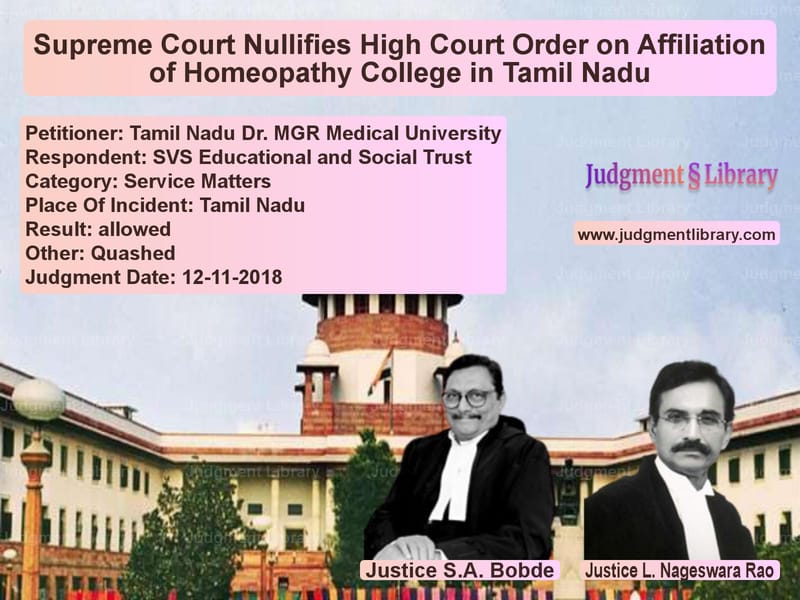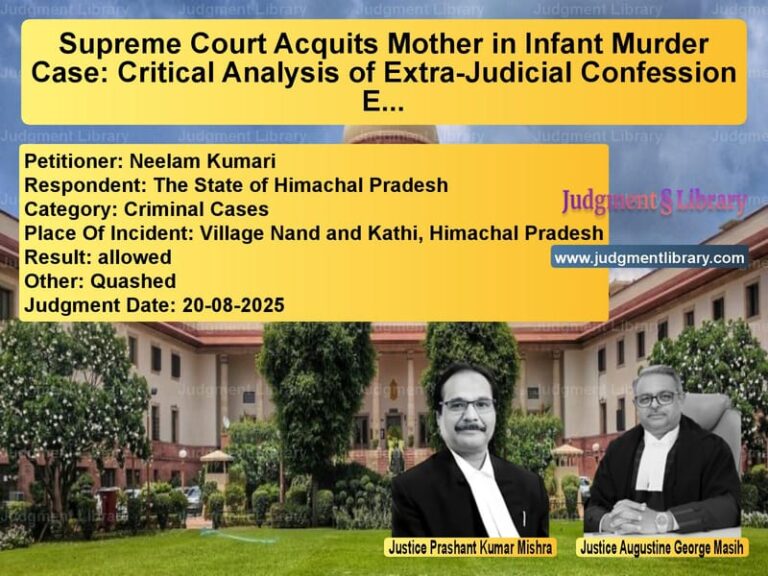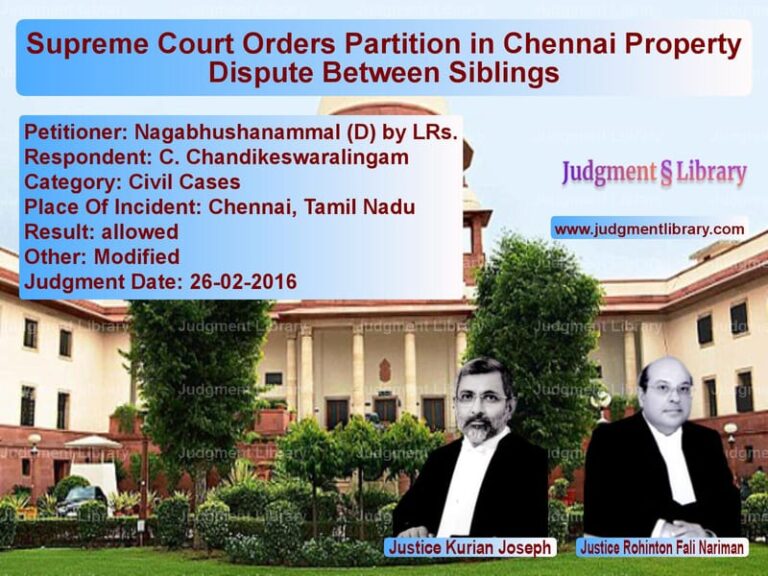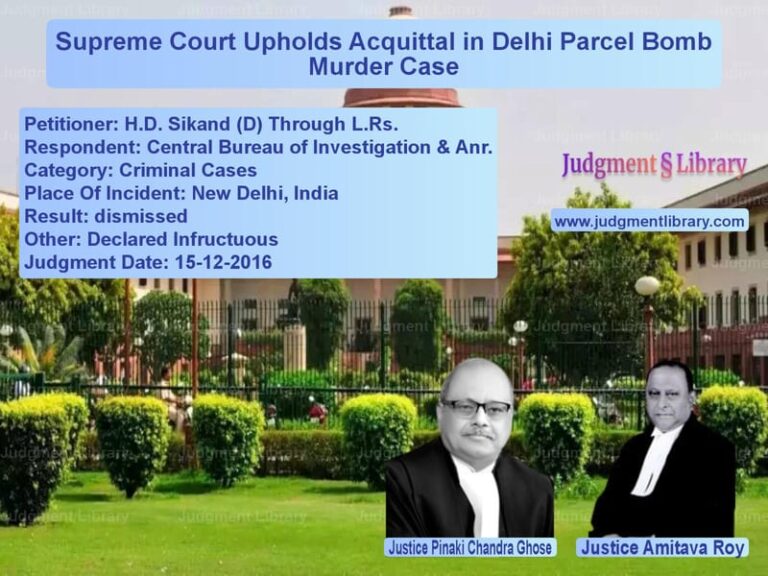Supreme Court Nullifies High Court Order on Affiliation of Homeopathy College in Tamil Nadu
The Supreme Court of India recently ruled on the case of Tamil Nadu Dr. MGR Medical University v. SVS Educational and Social Trust, concerning the denial of provisional affiliation to a homeopathy medical college. The Court held that the Madras High Court erred in granting relief to the institution despite its failure to meet statutory requirements for affiliation.
Background of the Case
The case revolved around the SVS Educational and Social Trust, which sought provisional affiliation for its BHMS (Bachelor of Homeopathy Medicine and Surgery) program from Tamil Nadu Dr. MGR Medical University. The institution had earlier obtained permission from the Ministry of AYUSH for the academic year 2015-2016, subject to compliance with infrastructure and faculty requirements.
However, due to deficiencies found in inspections conducted later and the unfortunate death of three students in January 2016, the Tamil Nadu government directed the relocation of existing students to another college, leading to the closure of the SVS institution.
Key Legal Proceedings
University’s Decision to Reject Affiliation
- On April 8, 2016, the university rejected the institution’s request for provisional affiliation, citing failure to rectify deficiencies in infrastructure and faculty.
- The institution challenged the rejection before the Madras High Court.
- The High Court initially dismissed the writ petition but later directed the university to reconsider affiliation.
High Court’s Intervention
- The Division Bench of the High Court ruled that since the permission granted for 2015-2016 was not rescinded, the institution was entitled to continue operating.
- The High Court directed the university to include the institution in the counseling process for admissions for the academic year 2017-2018.
- The university, aggrieved by the order, appealed to the Supreme Court.
Arguments Presented
Appellant’s (University) Arguments
- The institution lacked mandatory approval from the Central Government under Section 12A of the Homeopathy Central Council Act, 1973.
- Affiliation was denied based on multiple inspections that found inadequate infrastructure, faculty shortages, and other deficiencies.
- The High Court erred in assuming that prior approval granted for 2015-2016 continued indefinitely.
- The university had the statutory authority to deny affiliation in case of non-compliance.
Respondent’s (SVS Educational and Social Trust) Arguments
- The initial permission granted by AYUSH for 2015-2016 was not officially rescinded.
- The institution should have been allowed to rectify deficiencies while continuing operations.
- Students were being deprived of education due to the arbitrary decision of the university.
Supreme Court’s Observations
The Supreme Court found that the High Court’s ruling was flawed in multiple aspects. The Court observed:
“The permission granted for the year 2015-2016 was valid for only one year. The High Court erred in assuming that the approval continued and did not require renewal.”
Furthermore, the Supreme Court emphasized the importance of complying with the statutory requirements:
“It is clear from the record that the institution does not have requisite approval from the Central Government as mandated under Section 12A of the Act. Without such approval, the institution cannot claim entitlement to affiliation.”
Warning Against Provisional Admissions
The Court also warned against the practice of directing provisional admissions during litigation, stating:
“Exercise of jurisdiction in favor of provisional admissions during the pendency of a writ petition exposes students to the risk of losing precious years in case of dismissal of the petition.”
The Court cited previous rulings where similar issues had led to students suffering due to institutional failures.
Final Judgment
- The Supreme Court set aside the High Court’s ruling and restored the university’s decision to reject affiliation.
- The Court held that the institution was not entitled to admit students in 2017-2018 without necessary approvals.
- The university’s refusal to grant affiliation was deemed justified and in accordance with the law.
Implications of the Judgment
- Reinforces the role of regulatory authorities: The judgment affirms that universities and regulatory bodies have the final say in granting affiliation.
- Prevents substandard institutions from operating: The ruling ensures that educational institutions comply with basic requirements before admitting students.
- Safeguards students’ future: By cautioning against provisional admissions, the judgment protects students from legal uncertainties.
Conclusion
The Supreme Court’s ruling in this case upholds the integrity of educational standards in medical and homeopathy institutions. It serves as a reminder that institutions must comply with statutory requirements, and courts must be cautious in granting interim reliefs that could later prove detrimental to students.
Petitioner Name: Tamil Nadu Dr. MGR Medical University.Respondent Name: SVS Educational and Social Trust.Judgment By: Justice S.A. Bobde, Justice L. Nageswara Rao.Place Of Incident: Tamil Nadu.Judgment Date: 12-11-2018.
Don’t miss out on the full details! Download the complete judgment in PDF format below and gain valuable insights instantly!
Download Judgment: Tamil Nadu Dr. MGR M vs SVS Educational and Supreme Court of India Judgment Dated 12-11-2018.pdf
Direct Downlaod Judgment: Direct downlaod this Judgment
See all petitions in Education Related Cases
See all petitions in Judgment by S. A. Bobde
See all petitions in Judgment by L. Nageswara Rao
See all petitions in allowed
See all petitions in Quashed
See all petitions in supreme court of India judgments November 2018
See all petitions in 2018 judgments
See all posts in Service Matters Category
See all allowed petitions in Service Matters Category
See all Dismissed petitions in Service Matters Category
See all partially allowed petitions in Service Matters Category







